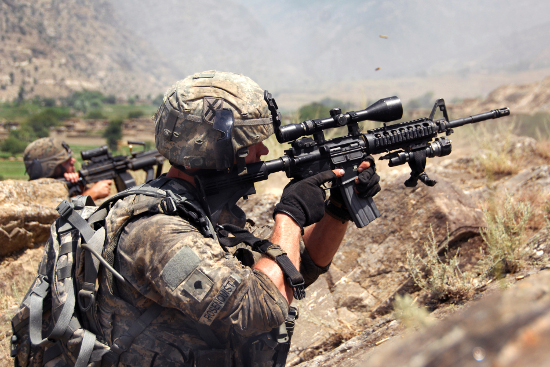4 Marines, 9 Afghan troops killed in Kunar ambush

|
| A US Army soldier assigned to C Company, 2nd Battalion, 12th Infantry Regiment, engages the enemy during a patrol near Combat Outpost Honaker Miracle in Kunar province, Afghanistan, on July 29, 2009. US Army photo by Evan Marcy. |
Yesterday's ambush in the eastern Afghan province of Kunar will certainly raise additional questions about the restrictive rules of engagement (ROE). Four US Marine military advisers, eight Afghan soldiers and policemen, and an Afghan interpreter were killed after the Taliban executed a well-planned ambush in Gangigal in Kunar. Jonathan S. Landay, a reporter for McClatchy Newspapers, writes about the firefight. The Afghan and US troops were denied artillery and air support that could have suppressed the heavy Taliban fire that was raining down from the slopes.
Dashing from boulder to boulder, diving into trenches and ducking behind stone walls as the insurgents maneuvered to outflank us, we waited more than an hour for U.S. helicopters to arrive, despite earlier assurances that air cover would be five minutes away.U.S. commanders, citing new rules to avoid civilian casualties, rejected repeated calls to unleash artillery rounds at attackers dug into the slopes and tree lines — despite being told repeatedly that they weren't near the village.
"We are pinned down. We are running low on ammo. We have no air. We've lost today," Marine Maj. Kevin Williams, 37, said through his translator to his Afghan counterpart, responding to the latter's repeated demands for helicopters.
Read the whole thing. According to Landay, the engagement began at 5:30 AM local time. The advisers called for air and artillery support 20 minutes later, at 5:50 AM. No air was available and artillery support didn't arrive until another 50 minutes later, at about 6:40 AM. Even then, only white phosphorus rounds were fired. Attack helicopters showed up another half hour later, at about 7:10. If Landay's account is accurate, US police and military trainers, as well as regular military units, are going to have to swallow a bitter pill each time they step outside the gates to patrol and conduct other missions.
More from Landay's account:
At 5:50 a.m., Army Capt. Will Swenson, of Seattle, WA, the trainer of the Afghan Border Police unit in Shakani, began calling for air support or artillery fire from a unit of the Army's 10th Mountain Division. The responses came back: No helicopters were available."This is unbelievable. We have a platoon (of Afghan army) out there and we've got no Hotel Echo," Swenson shouted above the din of gunfire, using the military acronym for high explosive artillery shells. "We're pinned down."
The insurgents were firing from inside the village and from positions in the hills immediately behind it and to either side. Judging from the angles of the ricochets, several appeared to be trying to outflank us to get better shots.
"What are you going to do?" Maj. Talib, the operations officer of the Afghan army unit, asked Maj. Williams through his translator.
"We are getting air," Williams replied.
"What are we going to do?" Talib repeated.
"We are getting air," Williams replied again, perhaps knowing that none was available but hoping to quiet Talib.
At 6:05 a.m., as our position was becoming increasingly tenuous, Swenson and Fabayo agreed that it was time to pull back and radioed for artillery to fire smoke rounds to mask our retreat.
"They don't have any smoke. They only have Willy Pete," Swenson reported, referring to white phosphorus rounds that spew smoke.
